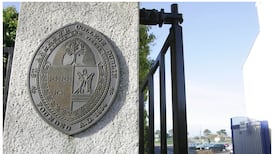OPINION:IT WAS the "standing room only for George Lee" report from the Goat Grill last Wednesday night that crystallised it all. Reel in the years to January 1986 and it was standing room only for Des O'Malley in the Marine Hotel in Sutton as the leader of the newly minted Progressive Democrats offered a new way forward.
It was middle-class Ireland that flocked to those rallies. There were 240,000 people unemployed (nearly 20 per cent of the workforce); in the five years to 1986, 72,000 people had emigrated; and the top tax rate was 65 per cent, with PRSI taking it over the 70 per cent mark. There were reports that the IMF would have to come in and sort out the mess. Sound familiar?
Was it any wonder people with a stake in the country were in despair? They felt completely let down by Garret FitzGerald’s bumbling government, and a reckless Haughey-led Fianna Fáil in opposition promising a painless solution to our woes
O’Malley’s rasping tones brooked no compromise. We had to sort out the mess ourselves: cut bloated public spending, taxing and borrowing; privatise State enterprises and replace monopoly with competition. The response was electric. In February of that year, just seven weeks after the foundation of the party, the PDs scored 25 per cent in an Irish Times poll.
Fast forward to 2009, and there is little doubt that Lee is fast becoming the pin-up of today’s frightened middle classes. For the past few years he has railed against profligate spending, and the tax incentives that bred a construction frenzy. His passionate intensity and his anxiety to help the country out is palpable and impressive.
But politics is a game of percentages and interest groups, and even the most passionate of firebrands may eventually feel compelled to trim his message lest he alienate particular constituencies. It happened Des O’Malley in the wake of the 1987 election where the PDs won an impressive 14 seats. Steeled by that electoral outcome, the Fianna Fáil minority government began to apply PD medicine by cutting public spending, closing hospitals, and abolishing agencies.
And when minister for health Rory O’Hanlon included the closure of Barrington’s Hospital in Limerick on his chopping list, Des O’Malley, one of the local TDs, was in the vanguard of the popular revolt to keep it open. It was good local politics, but many PD followers shook their heads.
So how long before today’s middle-class messiah feels compelled to compromise? Well, perhaps it has already happened. On Sunday night last on the Week in Politics Sean O’Rourke grilled the frontrunners in the Dublin South byelection on the kind of cuts in public spending required.
Was it time to cut the minimum wage, he asked. From the straight-talking George Lee came a vintage political fudge. “No; I wouldn’t cut it straight off at all,” he retorted. Labour’s Alex White said no, and the most courageous political response came from Fianna Fáil’s Shay Brennan. He said that wages across the board needed to be cut to restore competitiveness, and implied this included the minimum wage. Now, there is no doubting this is a political hot potato. But bearing in mind our budget deficit, the haemorrhage of jobs, and the continuing shopping exodus to the North, a minimum wage that is €2 per hour higher in the Republic than the North, and the second highest in Europe, has to be reviewed to make the cost of doing business here more competitive. Nobody knows this better than Lee.
Lee would also need to bear in mind the fickleness of the middle classes. There is no group more disinterested in politics when all is going well, and no group more electorally promiscuous when they feel under threat. When the good times are rolling, it’s virtually impossible to get them to political meetings. In bad times, they are fixated on politics. It was just over two years after giving the PDs 14 seats that, feeling relatively safe, the middle classes returned to their former Fianna Fáil and Fine Gael voting patterns in the June 1989 election. In Dublin South, Anne Colley, who topped the poll in 1987, was a casualty. Are you watching George Lee?
Stephen O’Byrnes is a communications consultant and was PD press officer 1986-1995








